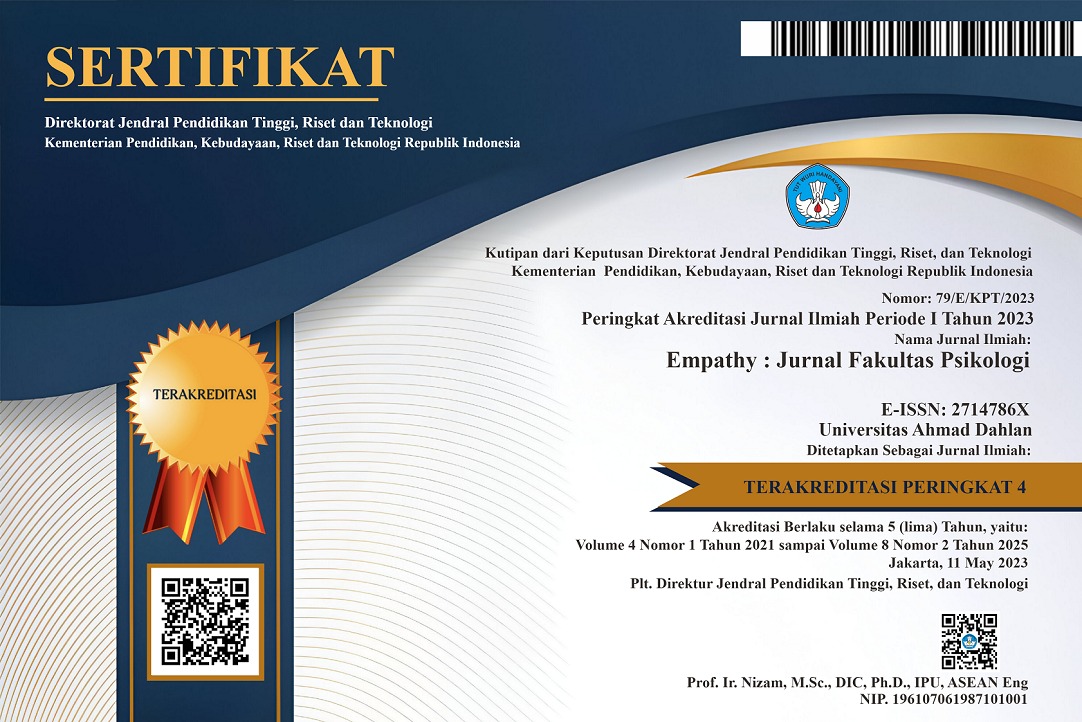Loneliness and psychological well-being among adolescents K-Pop fans
Abstract
Psychological well-being is important for adolescent, especially on their mental health. This study aimed to examine the relationship between loneliness and psychological well-being in adolescent K-pop fans. The population in this study were adolescents aged 13-18 years who were K-pop fans, with a research sample obtained from quota sampling with a total of 100 people. This research applied the quantitative method, while the data collection tools included the psychological well-being and loneliness scales. The data are then analyzed using the product moment technique. The study results show a significant negative relationship between loneliness and psychological well-being among adolescent K-pop fans. The level of psychological well-being and loneliness adolescent K-pop fans are in the moderate category. Based on the study results, the lower the level of loneliness among adolescents, the higher the psychological well-being will be and vice versa. The higher the level of loneliness, the lower the psychological well-being.
Keywords
Full Text:
PDFReferences
Almubaarokah, R. N. (2021). Hubungan antara kesepian dengan psychological well-being pada pengguna aplikasi kencan daring selama pandemi. Skripsi, Universitas Negeri Jakarta
Diener, E. (2005). Guidelines for national indicators of subjective well being and ill being. University of Illnois.
Fachrosi, E., Fani, D. T., Lubis, R. F., Aritonang, N. B., Azizah, N., Saragih, D. R., & Malik, F. (2020). Dinamika fanatisme penggemar K-Pop pada komunitas BTS-Army Medan. Jurnal Diversita, 6(2), 194-201.
Fatimah, N., Noviekayati, I. G. A. A., & Rina, A. P. (2021). Perilaku celebrity worship pada remaja komunitas Nctzens di Indonesia ditinjau dari loneliness. SUKMA: Jurnal Penelitian Psikologi, 2(2), 122-135.
Fitriana, M. (2019). Hubungankontrol diri dengan pemujaan terhadap idola pada remaja penggemar K-pop. Psikoborneo: Jurnal Ilmiah Psikologi, 7(3), 450-456.
Gierveld, D. J.,Tilburg, T.V., & Dykstra, P.A. (2006). Loneliness and social isolation: in Cambridge handbook of personal relationship (p-45500). Cambridge: Cambridge University Press
Gross, E. F., Juvonen, J., & Gable, S. L. (2002). Internet use and well-being in adolescence. Journal of Social Issues, 58(1), 75–90.
Gumelar, S. A., Almaida, E., & Laksmiwati, A. A. (2021). Dinamika psikologis fangirl K-Pop. Cognicia, 9(1), 17-24.
Hakim, A. R., Mardhiyah, A., Novtadijanto, D. M. I., Nurkholifah, N., Ramdani, Z., & Amri, A. (2021). Pembentukan identitas diri pada Kpopers. Motiva: Jurnal Psikologi, 4(1), 18-31.
Hardiantoro, A. (2022). Mengapa remaja Indonesia kian menggemari idol K-pop?. Kompas.com. https://www.kompas.com/tren/read/2022/05/22/123000665/mengapa-remaja-indonesia-kian-menggemari-idol-kpop-. 28 Mei 2022, 11.36.
Hurlock, E.B. (1990). Perkembangan anak, suatu pendekatan sepanjang rentang usia. Erlangga.
Kaparang, O.M. (2013). Analisa gaya hidup remaja dalam mengimitasi budaya pop Korea melalui televisi (Studi pada siswa SMA Negeri 9 Manado). Jurnal Acta Diurna, 2(2), 1-15.
Kovacs, B., Caplan, N., Grob, S., King, M. (2021). Social networks and loneliness during the covid- 19 pandemic. Socius: Sociological Research for a Dynamic World, 7.
Li, J., Zhou, L., Van Der Heijden, B., Li, S., Tao, H., & Guo, Z. (2021). Social Isolation, Loneliness and Well-Being: The Impact of WeChat Use Intensity During the COVID-19 Pandemic in China. Front. Psychol. 12:707667.
Nurrohamah, Y. F. & Prakosa, H. (2019). Hubungan psychological well-being dan celebrity worship pada anggota fansclub exo di Bandung. Prosiding Psikologi Seminar Penelitian Sivitas Akademika Unisba, 5(1), 181-186.
Purnomosidi, F. & Azzahra, P. N. (2023). Konsep diri remaja penggemar K-pop. Bureaucracy Journal: Indonesia Journal of Law and Social-Political Governance, 3 (1), 944-956.
Qualter, P., Vanhalst, J., Harris, R., Van Roekel, E., Lodder, G., Bangee, M., Maes, M., & Verhagen, M. (2015). Loneliness across the life span. Perspectives on psychological science : a journal of the Association for Psychological Science, 10(2), 250–264.
Roem, S. A., Zen, E. F., & Multisari, W. (2022). Kontrol diri remaja penggemar K-Pop (Studi fenomenologi pada siswa penggemar K-Pop di SMK). Jurnal Pembelajaran, Bimbingan, Dan Pengelolaan Pendidikan, 2(5), 479–490.
Russel, D., Peplau, L. A., & Cutrona, C. E.. (1980). The revised UCLA loneliness scale: concurrent and discriminant validity evidence. Journal of Personality and Social Psychology, 39, 472-480
Russell, D. W. (1996). UCLA loneliness scale (version 3): Reliability, validity and factor structure. Journal of Personality Assesment, 66(1), 20-40
Ryff, C. D. (1989). Happiness is everything, or is it? explorations on the meaning of psychological well-being Journal American Psychological Association 57, (6), 1069-1081.
Ryff, C. D. (1994). Psychological well-being in adult life. Current Dirrections in Psychological Science. http://midmac.med.harvard.edu/bullet3.
Ryff, C.D. & Keyes, C.L.M. (1995). The structure of psychological well-being revisited. Journal of Personality and Social Psychology, 57(69), 719-727
Santrock, J. W. (2012). Life-span development. Erlangga.
Syam, H. M. (2015). Globalisasi media dan penyerapan budaya asing analisis pada pengaruh budaya popular Korea di kalangan remaja Kota Banda Aceh. Avant Garde, 3(1).
DOI: http://dx.doi.org/10.12928/empathy.v6i2.26151
Refbacks
- There are currently no refbacks.
Copyright (c) 2024 Luthfiana Nur Fauziyah, Herlina Siwi Widiana, Arini Widyowati

This work is licensed under a Creative Commons Attribution-ShareAlike 4.0 International License.
================================================================================================
ISSN 2303-114X (print) || 2714-786X (online)
Organized by the Faculty of Psychology
Published by Universitas Ahmad Dahlan, Yogyakarta
Website: http://journal.uad.ac.id/index.php/EMPATHY
email: empathy.jfp@psy.uad.ac.id
Lisensi Creative Commons Atribusi-BerbagiSerupa 4.0 Internasional




